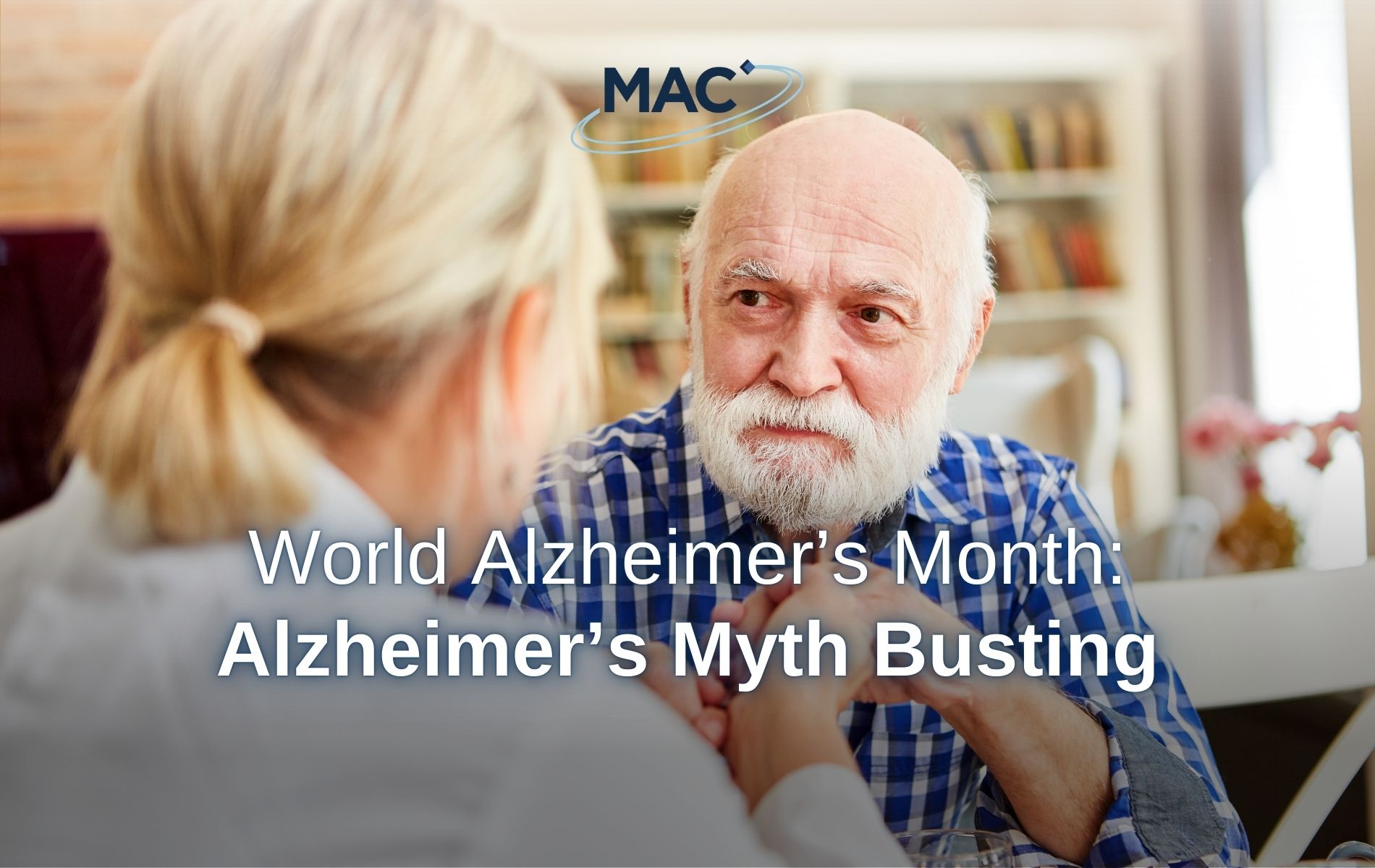It’s estimated that nearly one million people in the UK are living with some form of dementia, but more than one third do not have a diagnosis1. Alzheimer’s disease is the most common form of dementia and is a physical condition that damages the brain over time2. There are many misconceptions about Alzheimer’s, and for World Alzheimer’s Month, we’re addressing a few of them.
Myth 1: Alzheimer’s symptoms are a natural part of ageing
Becoming more forgetful as you age is common, for example, forgetting the name of a new acquaintance. However, Alzheimer’s is more than just occasional memory loss; it is a condition that causes the malfunction and ultimate death of brain cells3. This can lead to concentration issues, poor judgement, difficulty recognising loved ones and familiar places, and losing track of the date or time of year, to name a few4. When memory loss is coupled with these symptoms, it may be a sign of Alzheimer’s disease.
Myth 2: Only people over 70 develop Alzheimer’s disease
While age is the greatest risk factor for Alzheimer’s and dementia, and most people start showing symptoms in their 60s, some people develop symptoms earlier. Alzheimer’s can affect people as young as 30; this is known as younger-onset or early-onset Alzheimer’s5. Early detection of Alzheimer’s and research into the development of rapid-action diagnostic tools are critical for people showing signs of dementia.
Myth 3: There’s nothing you can do to reduce your risk of Alzheimer’s
There is evidence to indicate that maintaining a healthy lifestyle can reduce your risk of developing Alzheimer’s. You may be able to delay the onset of, or reduce the risk of, Alzheimer’s by:
- Stopping smoking
- Eating a healthy, balanced diet
- Exercising regularly
- Reducing alcohol consumption
- Getting sufficient sleep
- Staying mentally and socially active6.
However, no behaviour, diet, or lifestyle change is guaranteed to prevent Alzheimer’s or dementia, and some are easier to incorporate than others. If you’re thinking of making a lifestyle change, you may wish to consult with your GP for advice regarding nutrition, activity level, and overall health.
Myth 4: At-home genetic testing can tell you if you’re going to get Alzheimer’s
Self-testing genetic kits typically extract the DNA from a saliva sample and test for genes that can increase your risk of developing certain conditions, like Alzheimer’s. However, while these tests can indicate whether you have these genes, they cannot fully assess your risk of getting the condition. Developing Alzheimer’s is most likely determined by a combination of genes and environment, many of which the self-testing kits cannot test for7.
The likelihood of developing Alzheimer’s is complex and involves an interaction of multiple factors, not just genetics. Having a genetic predisposition does not mean that you will develop Alzheimer’s disease, just as not having the genes does not mean that you’re protected from developing the condition7.
Myth 5: There are no treatments for people with Alzheimer’s
There is currently no cure for Alzheimer’s disease. However, there are medications available that aim to slow the progression of the condition, such as donanemab and lecanemab3, and others that may lessen the severity of symptoms, such as acetylcholinesterase (AChE) inhibitors. Support is also available for those living with Alzheimer’s, and their loved ones, to help them cope with everyday life3.
Research is also very promising, with hundreds of studies underway to improve our understanding of the condition. Clinical trial volunteers have led to significant progress in the detection, diagnosis, and treatment of Alzheimer’s. By taking part in Alzheimer’s research, you could help to advance research into the disease.
Have you ever considered taking part in a clinical trial?
MAC is leading the way in the development of pioneering new medicines for a wide range of conditions. Whatever your background, you can help to make medical developments that could improve the quality of life for millions of people.
To register your interest in future Alzheimer’s clinical trials or research into other medical conditions, researching potential new treatments, visit our future studies webpage.
References
1 Alzheimer’s Society – How many people have dementia in the UK?
2 Alzheimer’s Society – Facts for the media about dementia
3 Alzheimer’s Association – Alzheimer’s & Memory Loss Myths
4 Alzheimer’s Society – Memory loss and dementia
5 Alzheimer’s Research UK – What is Alzheimer’s disease?
6 NHS – Alzheimer’s disease – Prevention
7 Alzheimer’s Society – Genetic testing kits and dementia




